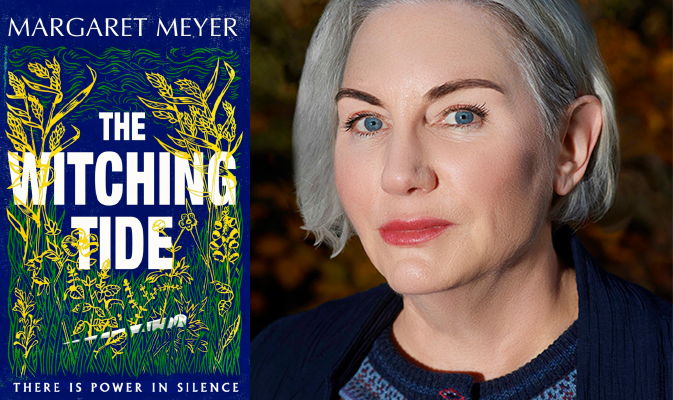
Margaret Meyer was born in Canada, grew up in New Zealand and now lives in Norwich, England. She was a publisher and literature developer before retraining as a mental health therapist, working in schools, prisons and addiction recovery centres as well as in private practice. From 2016-17, she took part in our Escalator Talent Development Scheme, and in 2020 she completed an MA in Creative Writing from the University of East Anglia. Her writing includes essays, flash fiction and short stories. The Witching Tide, her first novel, is inspired by the events of the East Anglian witch hunt of 1645-7 and is dedicated to the more than 100 innocent women who lost their lives.
Margaret reflects on her time with us in the Escalator programme.
How do you feel your selection for the Escalator programme has shaped your approach to writing and your writing process?
I’m still grateful for the opportunities that Escalator brought me, and I still marvel that Escalator was prepared to invest time and money in my artistic development. And also that Amy Sackville – a writer I admire – endorsed my work and was so generous with her time, advice and encouragement. Before Escalator I’d spent several years of working on my own, in something of a writerly vacuum. Being selected for the scheme, and having the benefit of Amy’s intelligent, exacting feedback as well as her encouragement, were a tremendous spur. The opportunity to take part in the Agents and Publishers Showcase at the end of the scheme was the first time I’d had conversations with literary agents. Several of them expressed interest in my work. This was a revelation and of course, very encouraging.
‘Escalator is practical, but it is also a kitemark of quality that’s well recognised across the UK writing world.’
Escalator affirmed something vital: my identity as an early career writer. I have no doubt that having Escalator on my CV also influenced the success of my subsequent Arts Council application (for a writing grant) and also my application to UEA’s prose MA.
Escalator is practical, but it is also a kitemark of quality that’s well recognised across the UK writing world.
How did Escalator help you towards the publication of your debut novel The Witching Tide in 2023?
Writing can be a very lonely endeavour. Without Escalator, my writing ambitions would very likely have floundered. For me, the legacy of being part of Escalator has been as important as taking part.
‘… it’s never been more important that literature and contemporary writing reflects the strength, diversity and plurality of UK voices.’
Escalator gifted me a great sense of momentum; I came out of it feeling inspired, validated, and with a group of new writer friends. My mentor Amy Sackville also continued to be very generous with her time, reading my work and also providing references for several important funding applications. Our 2016 cohort continued to meet for several years afterwards. When I started work on the manuscript that became The Witching Tide, this group was the obvious place to go for feedback, ideas, recommended reading, tea, laughs, and a sense of community that is, actually, essential. We are still in touch, and we still celebrate each other’s successes as they come along.
Escalator supports early career writers from the East of England and often focuses on those who’ve experienced barriers to publication. What are your thoughts around supporting writers in this region and supporting voices less often represented?
Making a living as an artist of any kind has always been difficult, but in recent times it’s become very much harder. For all the supposed egalitarianism of the 2020s, there is still a widespread perception that making art, and forging an identity as an artist, is an indulgence. And yet, it’s never been more important that literature and contemporary writing reflects the strength, diversity and plurality of UK voices – especially those that have been silenced, marginalised or otherwise left out of ‘the canon’.
As well as tough financial realities – most writers of necessity have ‘day jobs’ – there are entrenched cultural barriers which can be less tangible but are no less constraining. Age, gender, ethnicity, class and digital literacy: these can and do hold writers back. Escalator has a clear role to play in creating opportunities and showcasing the abundance of writing talent to be found in East Anglia.
Funding in the arts has been hit hard over the years and this year has been devastating. What would you like to say to those who are considering donating to the Escalator campaign?
I would say: why wouldn’t you invest?
Every pound donated makes a difference to someone’s life chances.
Every pound donated makes an active difference to the social as well as the economic success of the UK’s creative industries.
Literature is one of the least expensive but most impactful artforms: it can and does make appreciable differences to people’s lives, and the excellence of UK writing is recognised around the world.
Good writing can uplift, confront, celebrate, and militate for change. To donate to Escalator is to invest in an upcoming cadre of writers and arts activists whose work can and will have a positive influence on the world.
Donate to take Escalator to the next level
Each year, Escalator provides a cohort of emerging writers from the East of England with bespoke mentoring, skills development masterclasses, industry connections and showcases.
So far, Escalator has transformed the careers of over 130 writers, helping them hone their craft, get published, earn critical acclaim and more. Today, we need your support to take Escalator to the next level. For a limited time, receive a FREE screen print when you donate to our Escalator: It’s Next Level campaign.






